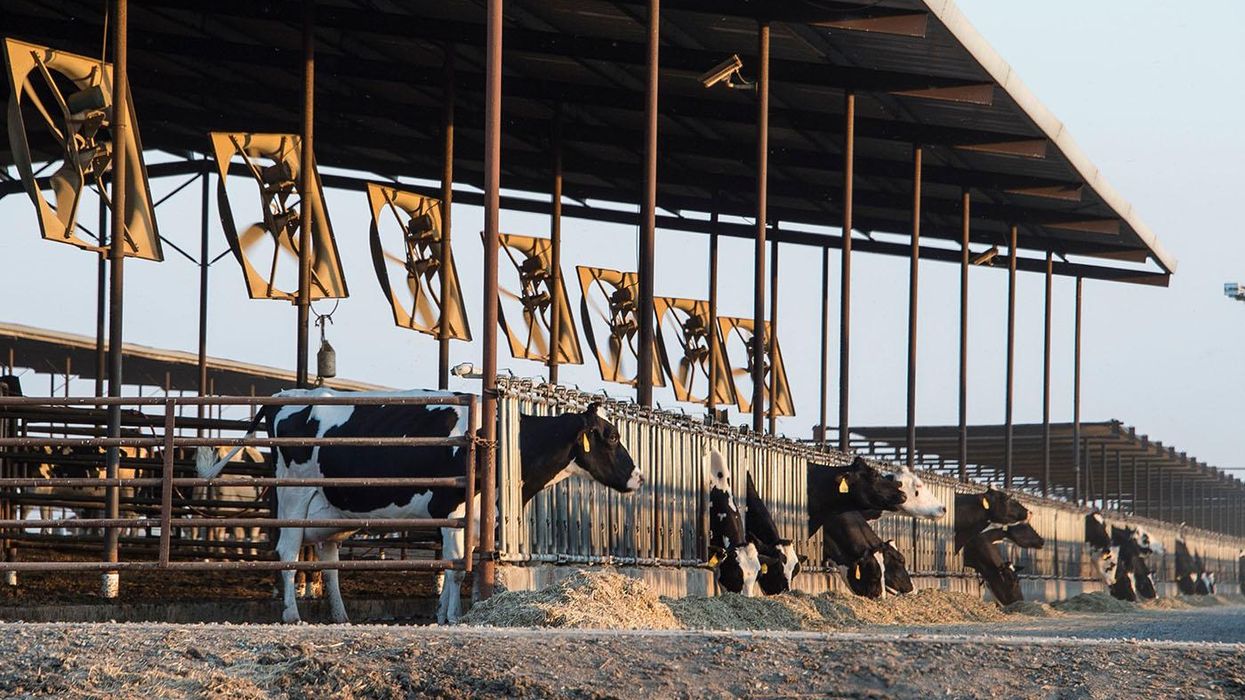Scientists, Groups to USDA: Stop Ignoring Climate Threat of Meat and Dairy
"Secretary Vilsack can't keep his head in the sand anymore, because this letter delivers the message loud and clear," said a Center for Biological Diversity campaigner.
More than 250 advocacy groups, scientists, and other experts on Thursday urged U.S. Secretary of Agriculture Tom Vilsack to "stop disregarding the science on the climate cost of meat and dairy in high-consuming countries like the United States, and advancing the industries that are driving agricultural emissions."
The coalition's letter—spearheaded by the Center for Biological Diversity—came after Vilsack attended the United Nations Climate Change Conference (COP28) last month and was asked if he was hearing about cutting meat consumption as a climate solution.
According toPolitico, Vilsack responded that "I don't hear much about that," but "I did hear about the important role that strategies for methane reduction could play in making the current livestock industry more sustainable."
"We have to address our meat-heavy diets now, or the climate emergency will force us to."
The letter pushes back, highlighting that "in addition to numerous panels discussing this topic at COP28, the United States joined more than 150 nations in signing the Emirates Declaration on Sustainable Agriculture, Resilient Food Systems, and Climate Action."
"Furthermore, during the first-ever Food, Agriculture, and Water Day at COP, which you personally attended, the U.N. Food and Agriculture Organization launched a highly publicized roadmap to align food systems with the Paris agreement," the letter adds. "The FAO roadmap specifically identifies the inclusion of environmental considerations in national dietary guidelines as well as the importance of improving school food and public procurement programs as effective government actions."
Despite industry pressure, the meat and dairy sector's contributions to the climate emergency as well as the related crises of the accelerated spread of disease, biodiversity loss, deforestation, and water pollution were documented and acknowledged by scientists, campaigners, and governments long before COP28—which was flooded by lobbyists for not only fossil fuel giants but also Big Ag.
As the letter details:
The Intergovernmental Panel on Climate Change not only identified dietary shifts, including meat reduction, as a vital climate mitigation strategy needed to meet the urgent emissions-reduction targets but emphasized the urgency to act. Research has shown that even if the energy sector immediately became climate-neutral, we still would not be able to achieve the reductions necessary to avoid catastrophic climate change without reducing meat and dairy consumption.
Additionally, the Kunming-Montreal Global Biodiversity Framework for the Conference on Biodiversity reaffirms the need to reduce animal protein under Target 16. Reducing animal protein is specifically named in the International Union for Conservation of Nature's Global Species Action Plan to achieve the Kunming-Montreal goals. Studies show that climate and biodiversity action must be aligned and failing to do so impedes our ability to address either crisis and further threatens food security.
"The science shows sustainable dietary shifts are key in high-consuming nations like the United States. Changes to production alone are not enough," the letter asserts. "The United States must take a leading role in reducing food system emissions with strategies that address both production and consumption of animal-based foods."
The U.S. Department of Agriculture "has repeatedly been urged by scientists (including its own scientific advisory committees), environmental experts, and public health advocates over the past decade to address excessive meat and dairy consumption in food and nutrition policy," the coalition wrote to Vilsack. "Under your leadership, the USDA has instead relied on false solutions such as feed additives, which have minimal impact in reducing emissions and aren't scalable, and biogas, which worsens the problem of pollution and greenhouse gas emissions."
The groups have three key demands for the USDA chief:
- Immediately make meat and dairy reduction a key part of USDA's climate strategy by acknowledging the role of consumption in climate mitigation and identifying opportunities to support and incentivize dietary shifts;
- Align food and climate goals in all USDA programs and policies, including by increasing access to healthy, plant-based foods in the school meal program; and
- Integrate sustainability into the Dietary Guidelines for Americans with an emphasis on plant-forward dietary patterns.
"Secretary Vilsack can't keep his head in the sand anymore, because this letter delivers the message loud and clear," said Jennifer Molidor, a senior food campaigner at the Center for Biological Diversity, in a statement. "We have to address our meat-heavy diets now, or the climate emergency will force us to."


